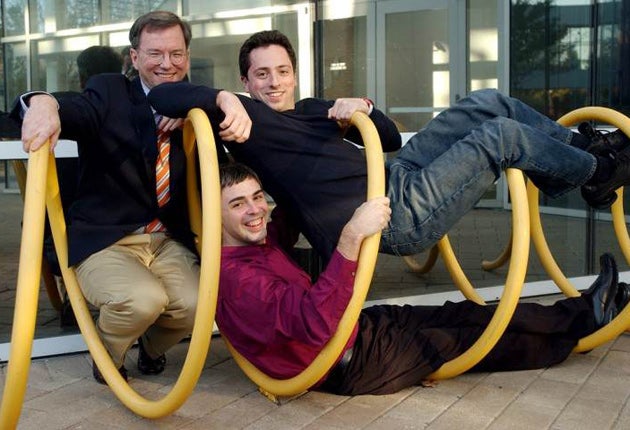Google guilty of privacy crime in web test case
Three executives convicted in Italy after school bullying video was uploaded

Your support helps us to tell the story
From reproductive rights to climate change to Big Tech, The Independent is on the ground when the story is developing. Whether it's investigating the financials of Elon Musk's pro-Trump PAC or producing our latest documentary, 'The A Word', which shines a light on the American women fighting for reproductive rights, we know how important it is to parse out the facts from the messaging.
At such a critical moment in US history, we need reporters on the ground. Your donation allows us to keep sending journalists to speak to both sides of the story.
The Independent is trusted by Americans across the entire political spectrum. And unlike many other quality news outlets, we choose not to lock Americans out of our reporting and analysis with paywalls. We believe quality journalism should be available to everyone, paid for by those who can afford it.
Your support makes all the difference.Three Google executives were convicted yesterday in a landmark privacy case that critics said could severely curtail internet freedom.
In what privacy experts described as a "chilling ruling", a judge in Milan imposed suspended prison sentences on the men who he said were criminally liable for allowing the posting of a clip on Google's video service which featured the bullying of an autistic child.
Google's senior vice-president and chief legal officer, David Drummond, the former Google Italy board member George De Los Reyes and global privacy counsel, Peter Fleischer, were all found guilty of violating the boy's privacy. The senior product marketing manager Arvind Desikan was acquitted. Legal experts said the case had worrying implications for all internet service providers and other hosting platforms which do not create their own content such as YouTube and Facebook.
During the trial the prosecutors accused Google of negligence, saying the video remained online for two months, even though web users had already posted comments asking for it to be removed. But Google argued that it had complied with the law by taking it down when contacted by the Italian authorities and assisted prosecutors in bringing those responsible to court.
In recent months the censorship of Italian websites has become a controversial issue following a spate of hate sites against officials, including the Prime Minister, Silvio Berlusconi.
But some experts fear that the case could have much broader implications. Last night Richard Thomas, the former Information Commissioner and consultant to the privacy law firm Hunton & Williams, told The Independent that the case was of grave concern to both internet users and service providers.
"Whether it is a one-off case or precedent-setting ruling, it will send reverberations around the whole world," he said. "This ruling is simply inconsistent with the way the internet works. There is no UK data law or European law that I know which could lead to this result, where employees of a company are sentenced to suspended jail sentences for being personally criminally liable for the uploading of a video clip in this way."
Andy Millmore, head of litigation at the media and entertainment law firm Harbottle & Lewis, said: "This ruling has major implications for internet service providers, potentially making them automatically liable for the first time for what others post on sites they own. If upheld, it will make it theoretically possible to pursue sites for hosting content which has not been posted with the express permission of the people featured."
The case arose in late 2006 when students at a school in Turin filmed and then uploaded a video that showed them bullying an autistic schoolmate. The complaint was brought by the boy's father with an Italian advocacy group for people with Down's syndrome, Vivi Down, although the boy had autism, not Down's.
The Italian public prosecutor greeted the verdict as a victory for individuals over corporations. "A company's rights cannot prevail over a person's dignity. This sentence sends a clear signal," the lawyer Alfredo Robledo said outside the Milan courthouse.
Last night Google said it hoped to overturn the verdicts on appeal, while the convicted executives issued their own statements. Mr Drummond said that the verdict set a "dangerous precedent".
The complaints of the Google executives are likely to fall on deaf ears in Italy, however. Sympathy for the victim was already running high this week following the emergence of an Italian group on Facebook calling for children with Down's syndrome be used for "target practice".
The Equal Opportunities minister, Mara Carfagna, said: "Italy will not tolerate incidents of discrimination of any sort, let alone against the disabled," and added: "Those responsible for creating this idiocy will be prosecuted." Facebook operators in the US shut the group down soon after.
The model: How it makes $23.6bn
* An analyst once described Google as an advertising business which has a good line in search results. Revenues hit $23.6bn in 2009, with 97 per cent coming from advertising. Every time there is a search on its site, an almost instantaneous auction is carried out, with an advertiser paying from a few cents to tens of dollars. Google's algorithms then place the adverts on its site.
* Most of this is done through AdWords, Google's ad system, which allows any company to create adverts at a low cost and make sure those adverts are tied to certain keywords. When those words are typed in, the company's advert will run next to the search results.
* The rest of Google's advertising revenues come from AdSense, which sells adverts on third-party sites. Of the 3 per cent of revenues not generated from ads, most come from providing branded email systems and other corporate tools to companies.
Join our commenting forum
Join thought-provoking conversations, follow other Independent readers and see their replies
Comments